BMSW4001: Reflective Report on Academic and Employability Skills
VerifiedAdded on 2023/06/07
|10
|2427
|63
Report
AI Summary
This reflective report delves into the author's learning journey within the Academic and Employability Skills module, employing Gibb's reflective model to analyze experiences in time management, paraphrasing, summarizing, and public speaking. Each section describes the initial situation, feelings, evaluation, and analysis, culminating in a conclusion and action plan for future improvement. The report highlights the challenges faced and lessons learned, such as the importance of backup plans in teamwork, the value of continuous learning in paraphrasing, the development of reading habits through summarizing, and overcoming introversion through public speaking training. The author reflects on personal growth and identifies strategies for future skill enhancement, emphasizing the role of reflective practice in professional development. References to relevant books and journals are included to support the analysis.
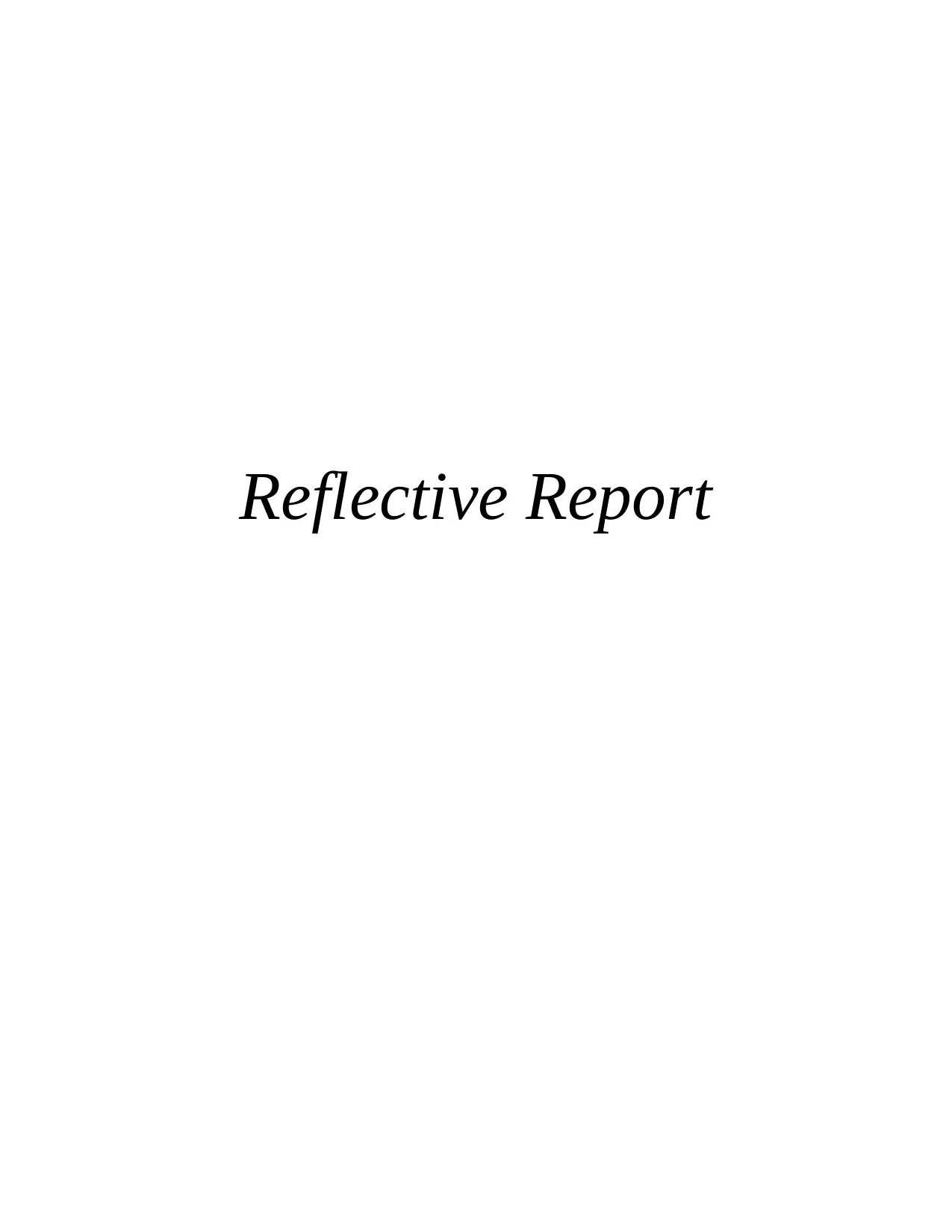
Reflective Report
Secure Best Marks with AI Grader
Need help grading? Try our AI Grader for instant feedback on your assignments.
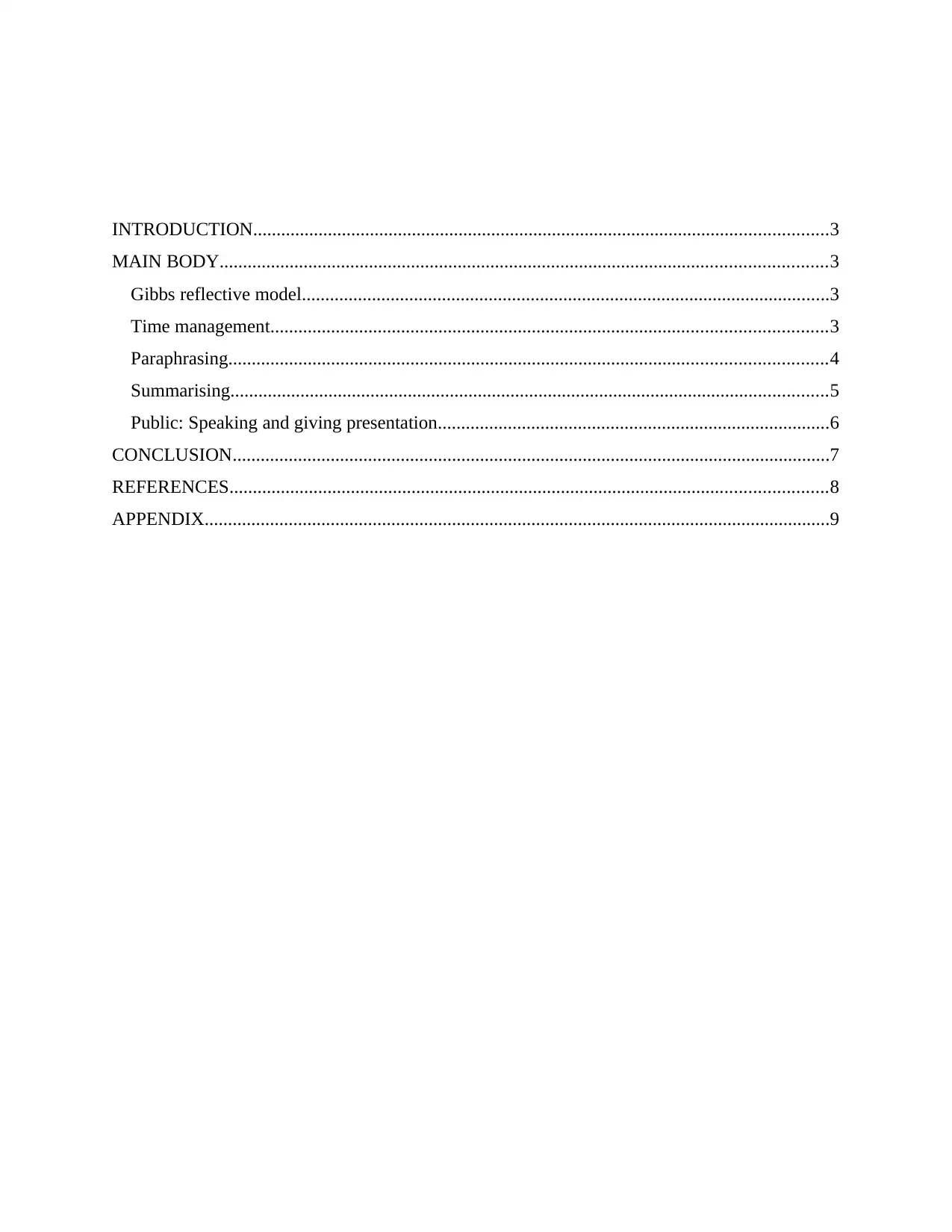
INTRODUCTION...........................................................................................................................3
MAIN BODY..................................................................................................................................3
Gibbs reflective model.................................................................................................................3
Time management.......................................................................................................................3
Paraphrasing................................................................................................................................4
Summarising................................................................................................................................5
Public: Speaking and giving presentation....................................................................................6
CONCLUSION................................................................................................................................7
REFERENCES................................................................................................................................8
APPENDIX......................................................................................................................................9
MAIN BODY..................................................................................................................................3
Gibbs reflective model.................................................................................................................3
Time management.......................................................................................................................3
Paraphrasing................................................................................................................................4
Summarising................................................................................................................................5
Public: Speaking and giving presentation....................................................................................6
CONCLUSION................................................................................................................................7
REFERENCES................................................................................................................................8
APPENDIX......................................................................................................................................9
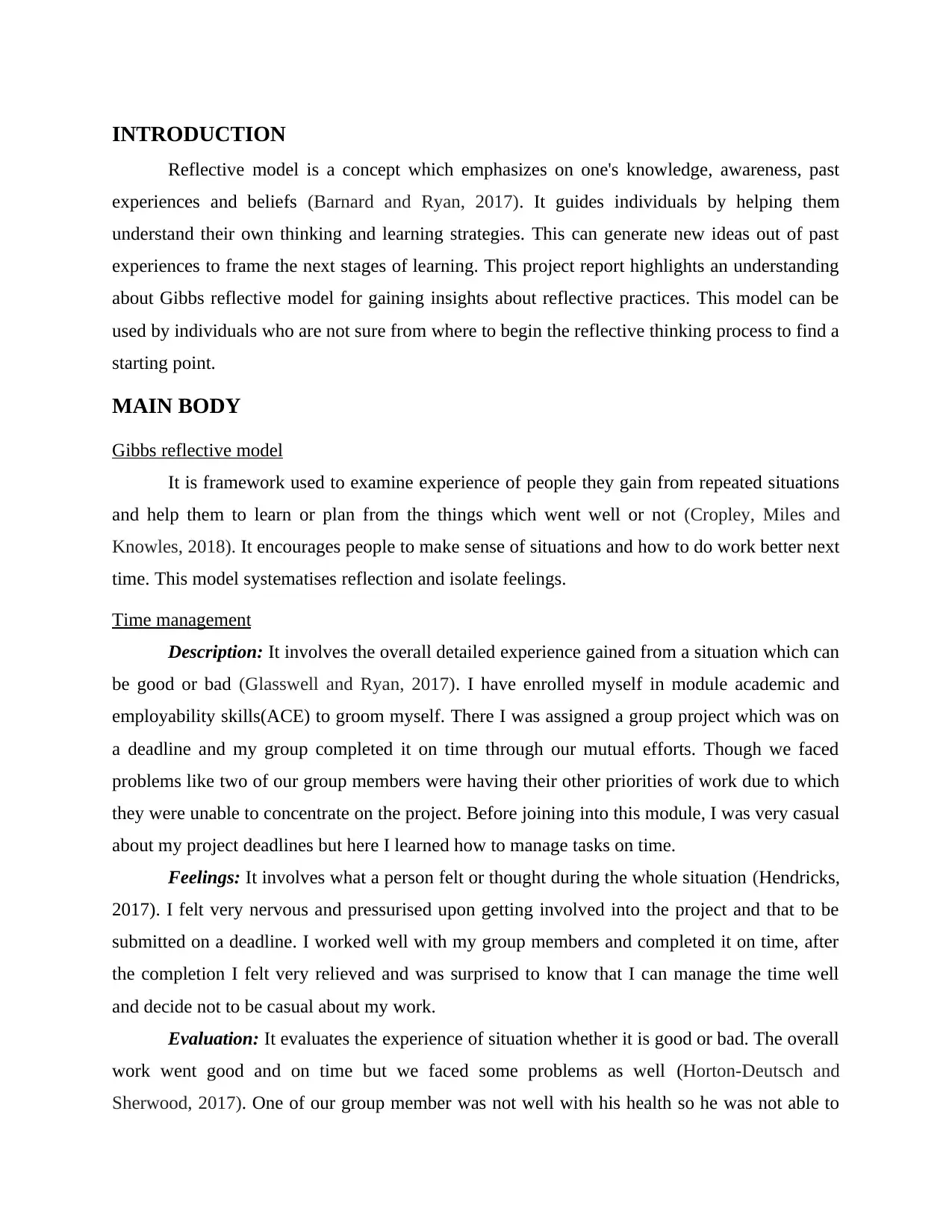
INTRODUCTION
Reflective model is a concept which emphasizes on one's knowledge, awareness, past
experiences and beliefs (Barnard and Ryan, 2017). It guides individuals by helping them
understand their own thinking and learning strategies. This can generate new ideas out of past
experiences to frame the next stages of learning. This project report highlights an understanding
about Gibbs reflective model for gaining insights about reflective practices. This model can be
used by individuals who are not sure from where to begin the reflective thinking process to find a
starting point.
MAIN BODY
Gibbs reflective model
It is framework used to examine experience of people they gain from repeated situations
and help them to learn or plan from the things which went well or not (Cropley, Miles and
Knowles, 2018). It encourages people to make sense of situations and how to do work better next
time. This model systematises reflection and isolate feelings.
Time management
Description: It involves the overall detailed experience gained from a situation which can
be good or bad (Glasswell and Ryan, 2017). I have enrolled myself in module academic and
employability skills(ACE) to groom myself. There I was assigned a group project which was on
a deadline and my group completed it on time through our mutual efforts. Though we faced
problems like two of our group members were having their other priorities of work due to which
they were unable to concentrate on the project. Before joining into this module, I was very casual
about my project deadlines but here I learned how to manage tasks on time.
Feelings: It involves what a person felt or thought during the whole situation (Hendricks,
2017). I felt very nervous and pressurised upon getting involved into the project and that to be
submitted on a deadline. I worked well with my group members and completed it on time, after
the completion I felt very relieved and was surprised to know that I can manage the time well
and decide not to be casual about my work.
Evaluation: It evaluates the experience of situation whether it is good or bad. The overall
work went good and on time but we faced some problems as well (Horton-Deutsch and
Sherwood, 2017). One of our group member was not well with his health so he was not able to
Reflective model is a concept which emphasizes on one's knowledge, awareness, past
experiences and beliefs (Barnard and Ryan, 2017). It guides individuals by helping them
understand their own thinking and learning strategies. This can generate new ideas out of past
experiences to frame the next stages of learning. This project report highlights an understanding
about Gibbs reflective model for gaining insights about reflective practices. This model can be
used by individuals who are not sure from where to begin the reflective thinking process to find a
starting point.
MAIN BODY
Gibbs reflective model
It is framework used to examine experience of people they gain from repeated situations
and help them to learn or plan from the things which went well or not (Cropley, Miles and
Knowles, 2018). It encourages people to make sense of situations and how to do work better next
time. This model systematises reflection and isolate feelings.
Time management
Description: It involves the overall detailed experience gained from a situation which can
be good or bad (Glasswell and Ryan, 2017). I have enrolled myself in module academic and
employability skills(ACE) to groom myself. There I was assigned a group project which was on
a deadline and my group completed it on time through our mutual efforts. Though we faced
problems like two of our group members were having their other priorities of work due to which
they were unable to concentrate on the project. Before joining into this module, I was very casual
about my project deadlines but here I learned how to manage tasks on time.
Feelings: It involves what a person felt or thought during the whole situation (Hendricks,
2017). I felt very nervous and pressurised upon getting involved into the project and that to be
submitted on a deadline. I worked well with my group members and completed it on time, after
the completion I felt very relieved and was surprised to know that I can manage the time well
and decide not to be casual about my work.
Evaluation: It evaluates the experience of situation whether it is good or bad. The overall
work went good and on time but we faced some problems as well (Horton-Deutsch and
Sherwood, 2017). One of our group member was not well with his health so he was not able to
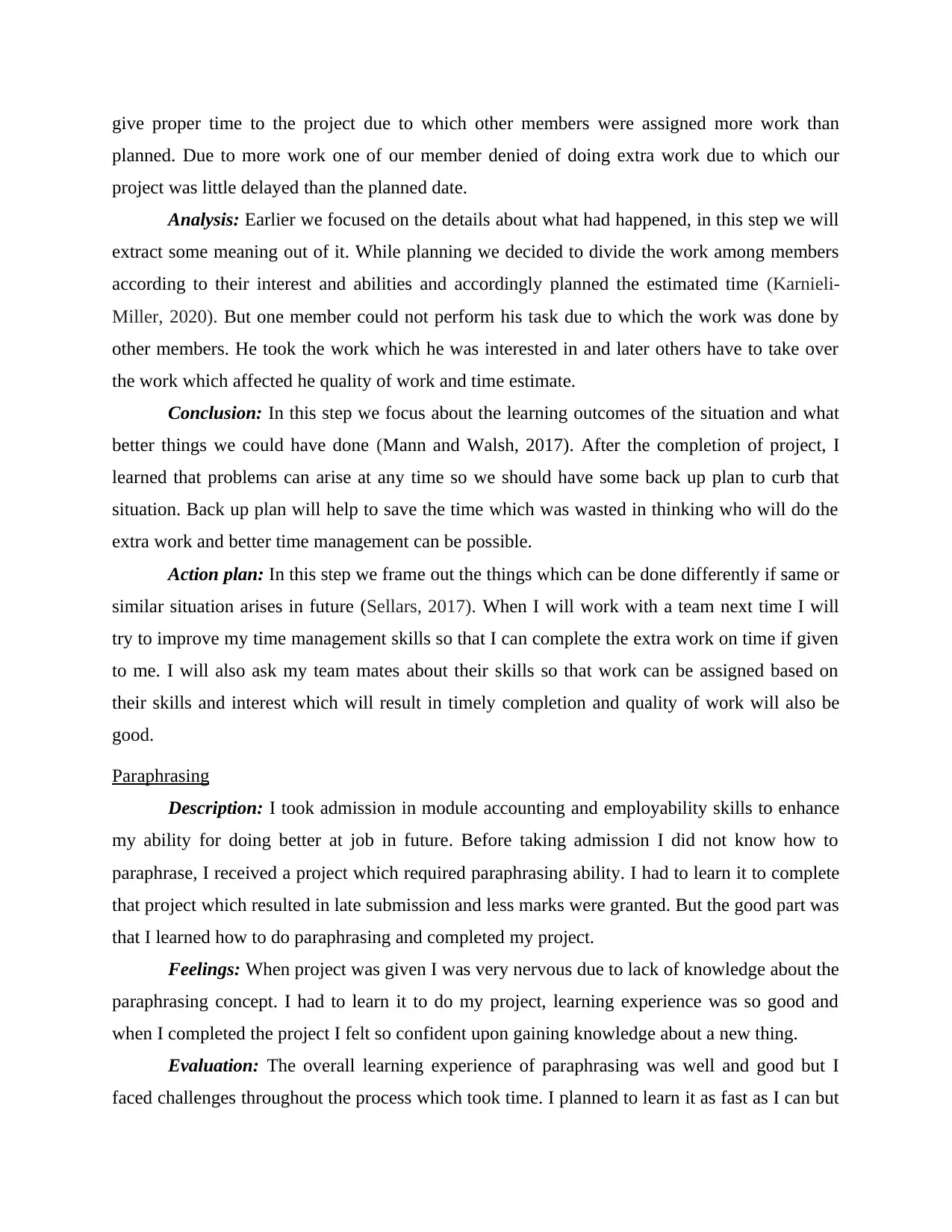
give proper time to the project due to which other members were assigned more work than
planned. Due to more work one of our member denied of doing extra work due to which our
project was little delayed than the planned date.
Analysis: Earlier we focused on the details about what had happened, in this step we will
extract some meaning out of it. While planning we decided to divide the work among members
according to their interest and abilities and accordingly planned the estimated time (Karnieli-
Miller, 2020). But one member could not perform his task due to which the work was done by
other members. He took the work which he was interested in and later others have to take over
the work which affected he quality of work and time estimate.
Conclusion: In this step we focus about the learning outcomes of the situation and what
better things we could have done (Mann and Walsh, 2017). After the completion of project, I
learned that problems can arise at any time so we should have some back up plan to curb that
situation. Back up plan will help to save the time which was wasted in thinking who will do the
extra work and better time management can be possible.
Action plan: In this step we frame out the things which can be done differently if same or
similar situation arises in future (Sellars, 2017). When I will work with a team next time I will
try to improve my time management skills so that I can complete the extra work on time if given
to me. I will also ask my team mates about their skills so that work can be assigned based on
their skills and interest which will result in timely completion and quality of work will also be
good.
Paraphrasing
Description: I took admission in module accounting and employability skills to enhance
my ability for doing better at job in future. Before taking admission I did not know how to
paraphrase, I received a project which required paraphrasing ability. I had to learn it to complete
that project which resulted in late submission and less marks were granted. But the good part was
that I learned how to do paraphrasing and completed my project.
Feelings: When project was given I was very nervous due to lack of knowledge about the
paraphrasing concept. I had to learn it to do my project, learning experience was so good and
when I completed the project I felt so confident upon gaining knowledge about a new thing.
Evaluation: The overall learning experience of paraphrasing was well and good but I
faced challenges throughout the process which took time. I planned to learn it as fast as I can but
planned. Due to more work one of our member denied of doing extra work due to which our
project was little delayed than the planned date.
Analysis: Earlier we focused on the details about what had happened, in this step we will
extract some meaning out of it. While planning we decided to divide the work among members
according to their interest and abilities and accordingly planned the estimated time (Karnieli-
Miller, 2020). But one member could not perform his task due to which the work was done by
other members. He took the work which he was interested in and later others have to take over
the work which affected he quality of work and time estimate.
Conclusion: In this step we focus about the learning outcomes of the situation and what
better things we could have done (Mann and Walsh, 2017). After the completion of project, I
learned that problems can arise at any time so we should have some back up plan to curb that
situation. Back up plan will help to save the time which was wasted in thinking who will do the
extra work and better time management can be possible.
Action plan: In this step we frame out the things which can be done differently if same or
similar situation arises in future (Sellars, 2017). When I will work with a team next time I will
try to improve my time management skills so that I can complete the extra work on time if given
to me. I will also ask my team mates about their skills so that work can be assigned based on
their skills and interest which will result in timely completion and quality of work will also be
good.
Paraphrasing
Description: I took admission in module accounting and employability skills to enhance
my ability for doing better at job in future. Before taking admission I did not know how to
paraphrase, I received a project which required paraphrasing ability. I had to learn it to complete
that project which resulted in late submission and less marks were granted. But the good part was
that I learned how to do paraphrasing and completed my project.
Feelings: When project was given I was very nervous due to lack of knowledge about the
paraphrasing concept. I had to learn it to do my project, learning experience was so good and
when I completed the project I felt so confident upon gaining knowledge about a new thing.
Evaluation: The overall learning experience of paraphrasing was well and good but I
faced challenges throughout the process which took time. I planned to learn it as fast as I can but
Secure Best Marks with AI Grader
Need help grading? Try our AI Grader for instant feedback on your assignments.
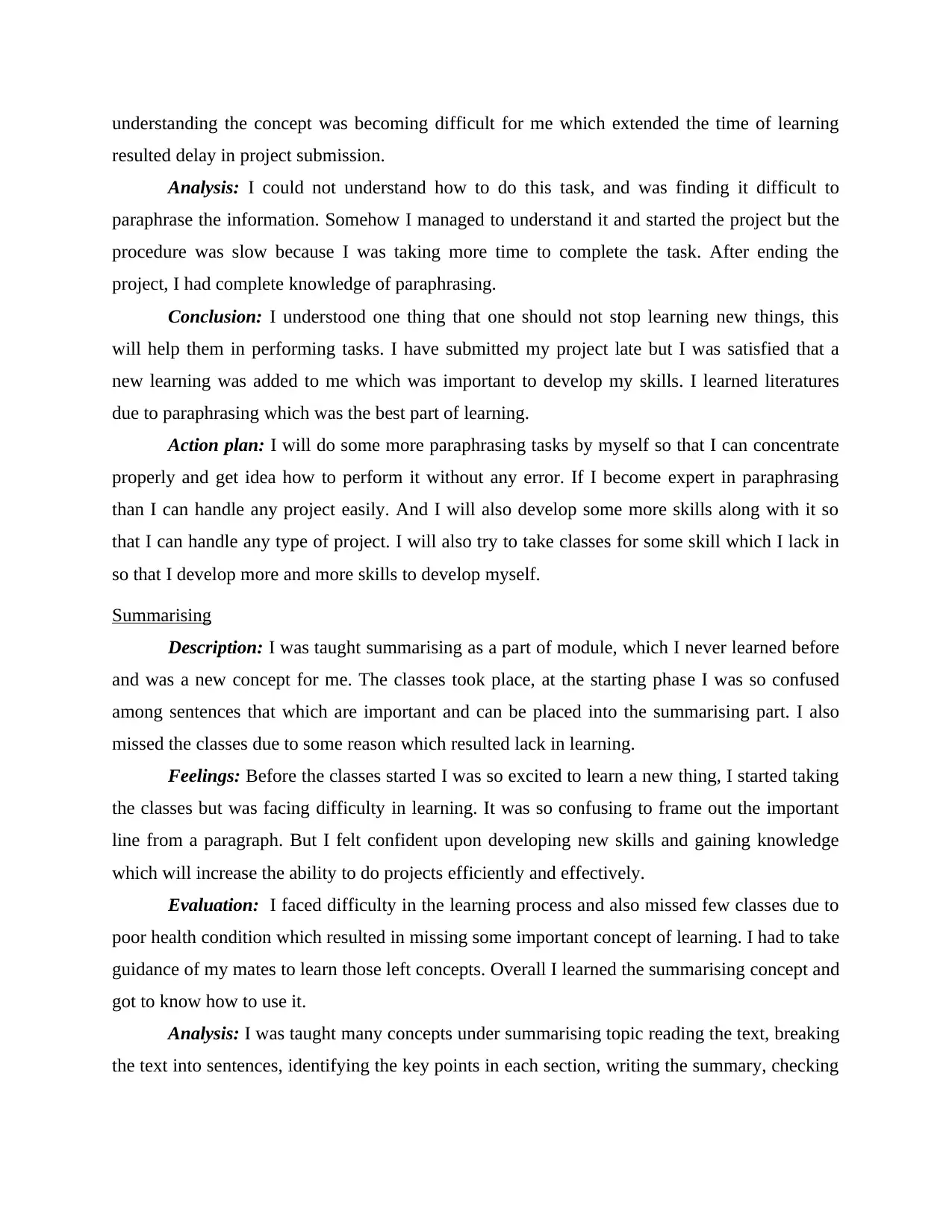
understanding the concept was becoming difficult for me which extended the time of learning
resulted delay in project submission.
Analysis: I could not understand how to do this task, and was finding it difficult to
paraphrase the information. Somehow I managed to understand it and started the project but the
procedure was slow because I was taking more time to complete the task. After ending the
project, I had complete knowledge of paraphrasing.
Conclusion: I understood one thing that one should not stop learning new things, this
will help them in performing tasks. I have submitted my project late but I was satisfied that a
new learning was added to me which was important to develop my skills. I learned literatures
due to paraphrasing which was the best part of learning.
Action plan: I will do some more paraphrasing tasks by myself so that I can concentrate
properly and get idea how to perform it without any error. If I become expert in paraphrasing
than I can handle any project easily. And I will also develop some more skills along with it so
that I can handle any type of project. I will also try to take classes for some skill which I lack in
so that I develop more and more skills to develop myself.
Summarising
Description: I was taught summarising as a part of module, which I never learned before
and was a new concept for me. The classes took place, at the starting phase I was so confused
among sentences that which are important and can be placed into the summarising part. I also
missed the classes due to some reason which resulted lack in learning.
Feelings: Before the classes started I was so excited to learn a new thing, I started taking
the classes but was facing difficulty in learning. It was so confusing to frame out the important
line from a paragraph. But I felt confident upon developing new skills and gaining knowledge
which will increase the ability to do projects efficiently and effectively.
Evaluation: I faced difficulty in the learning process and also missed few classes due to
poor health condition which resulted in missing some important concept of learning. I had to take
guidance of my mates to learn those left concepts. Overall I learned the summarising concept and
got to know how to use it.
Analysis: I was taught many concepts under summarising topic reading the text, breaking
the text into sentences, identifying the key points in each section, writing the summary, checking
resulted delay in project submission.
Analysis: I could not understand how to do this task, and was finding it difficult to
paraphrase the information. Somehow I managed to understand it and started the project but the
procedure was slow because I was taking more time to complete the task. After ending the
project, I had complete knowledge of paraphrasing.
Conclusion: I understood one thing that one should not stop learning new things, this
will help them in performing tasks. I have submitted my project late but I was satisfied that a
new learning was added to me which was important to develop my skills. I learned literatures
due to paraphrasing which was the best part of learning.
Action plan: I will do some more paraphrasing tasks by myself so that I can concentrate
properly and get idea how to perform it without any error. If I become expert in paraphrasing
than I can handle any project easily. And I will also develop some more skills along with it so
that I can handle any type of project. I will also try to take classes for some skill which I lack in
so that I develop more and more skills to develop myself.
Summarising
Description: I was taught summarising as a part of module, which I never learned before
and was a new concept for me. The classes took place, at the starting phase I was so confused
among sentences that which are important and can be placed into the summarising part. I also
missed the classes due to some reason which resulted lack in learning.
Feelings: Before the classes started I was so excited to learn a new thing, I started taking
the classes but was facing difficulty in learning. It was so confusing to frame out the important
line from a paragraph. But I felt confident upon developing new skills and gaining knowledge
which will increase the ability to do projects efficiently and effectively.
Evaluation: I faced difficulty in the learning process and also missed few classes due to
poor health condition which resulted in missing some important concept of learning. I had to take
guidance of my mates to learn those left concepts. Overall I learned the summarising concept and
got to know how to use it.
Analysis: I was taught many concepts under summarising topic reading the text, breaking
the text into sentences, identifying the key points in each section, writing the summary, checking
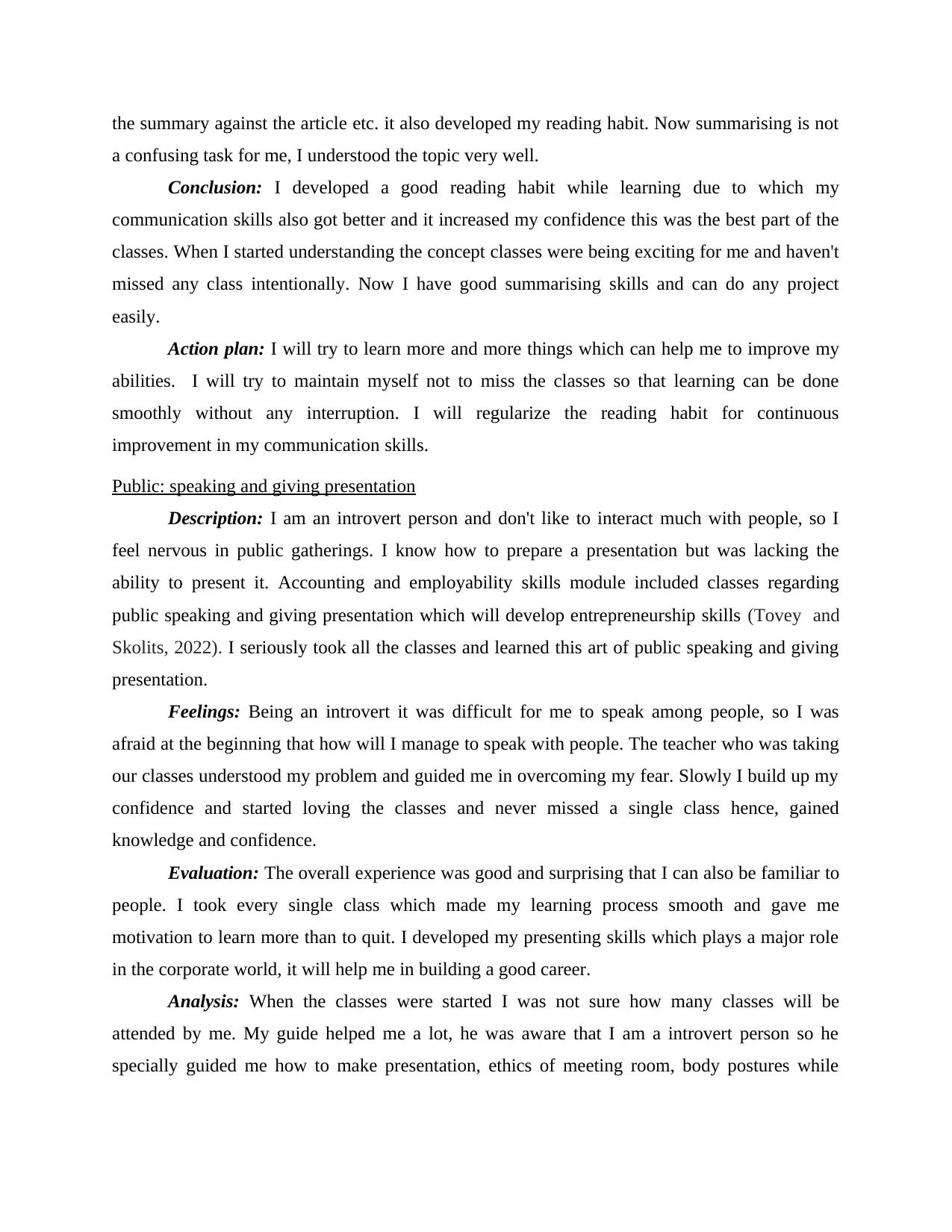
the summary against the article etc. it also developed my reading habit. Now summarising is not
a confusing task for me, I understood the topic very well.
Conclusion: I developed a good reading habit while learning due to which my
communication skills also got better and it increased my confidence this was the best part of the
classes. When I started understanding the concept classes were being exciting for me and haven't
missed any class intentionally. Now I have good summarising skills and can do any project
easily.
Action plan: I will try to learn more and more things which can help me to improve my
abilities. I will try to maintain myself not to miss the classes so that learning can be done
smoothly without any interruption. I will regularize the reading habit for continuous
improvement in my communication skills.
Public: speaking and giving presentation
Description: I am an introvert person and don't like to interact much with people, so I
feel nervous in public gatherings. I know how to prepare a presentation but was lacking the
ability to present it. Accounting and employability skills module included classes regarding
public speaking and giving presentation which will develop entrepreneurship skills (Tovey and
Skolits, 2022). I seriously took all the classes and learned this art of public speaking and giving
presentation.
Feelings: Being an introvert it was difficult for me to speak among people, so I was
afraid at the beginning that how will I manage to speak with people. The teacher who was taking
our classes understood my problem and guided me in overcoming my fear. Slowly I build up my
confidence and started loving the classes and never missed a single class hence, gained
knowledge and confidence.
Evaluation: The overall experience was good and surprising that I can also be familiar to
people. I took every single class which made my learning process smooth and gave me
motivation to learn more than to quit. I developed my presenting skills which plays a major role
in the corporate world, it will help me in building a good career.
Analysis: When the classes were started I was not sure how many classes will be
attended by me. My guide helped me a lot, he was aware that I am a introvert person so he
specially guided me how to make presentation, ethics of meeting room, body postures while
a confusing task for me, I understood the topic very well.
Conclusion: I developed a good reading habit while learning due to which my
communication skills also got better and it increased my confidence this was the best part of the
classes. When I started understanding the concept classes were being exciting for me and haven't
missed any class intentionally. Now I have good summarising skills and can do any project
easily.
Action plan: I will try to learn more and more things which can help me to improve my
abilities. I will try to maintain myself not to miss the classes so that learning can be done
smoothly without any interruption. I will regularize the reading habit for continuous
improvement in my communication skills.
Public: speaking and giving presentation
Description: I am an introvert person and don't like to interact much with people, so I
feel nervous in public gatherings. I know how to prepare a presentation but was lacking the
ability to present it. Accounting and employability skills module included classes regarding
public speaking and giving presentation which will develop entrepreneurship skills (Tovey and
Skolits, 2022). I seriously took all the classes and learned this art of public speaking and giving
presentation.
Feelings: Being an introvert it was difficult for me to speak among people, so I was
afraid at the beginning that how will I manage to speak with people. The teacher who was taking
our classes understood my problem and guided me in overcoming my fear. Slowly I build up my
confidence and started loving the classes and never missed a single class hence, gained
knowledge and confidence.
Evaluation: The overall experience was good and surprising that I can also be familiar to
people. I took every single class which made my learning process smooth and gave me
motivation to learn more than to quit. I developed my presenting skills which plays a major role
in the corporate world, it will help me in building a good career.
Analysis: When the classes were started I was not sure how many classes will be
attended by me. My guide helped me a lot, he was aware that I am a introvert person so he
specially guided me how to make presentation, ethics of meeting room, body postures while
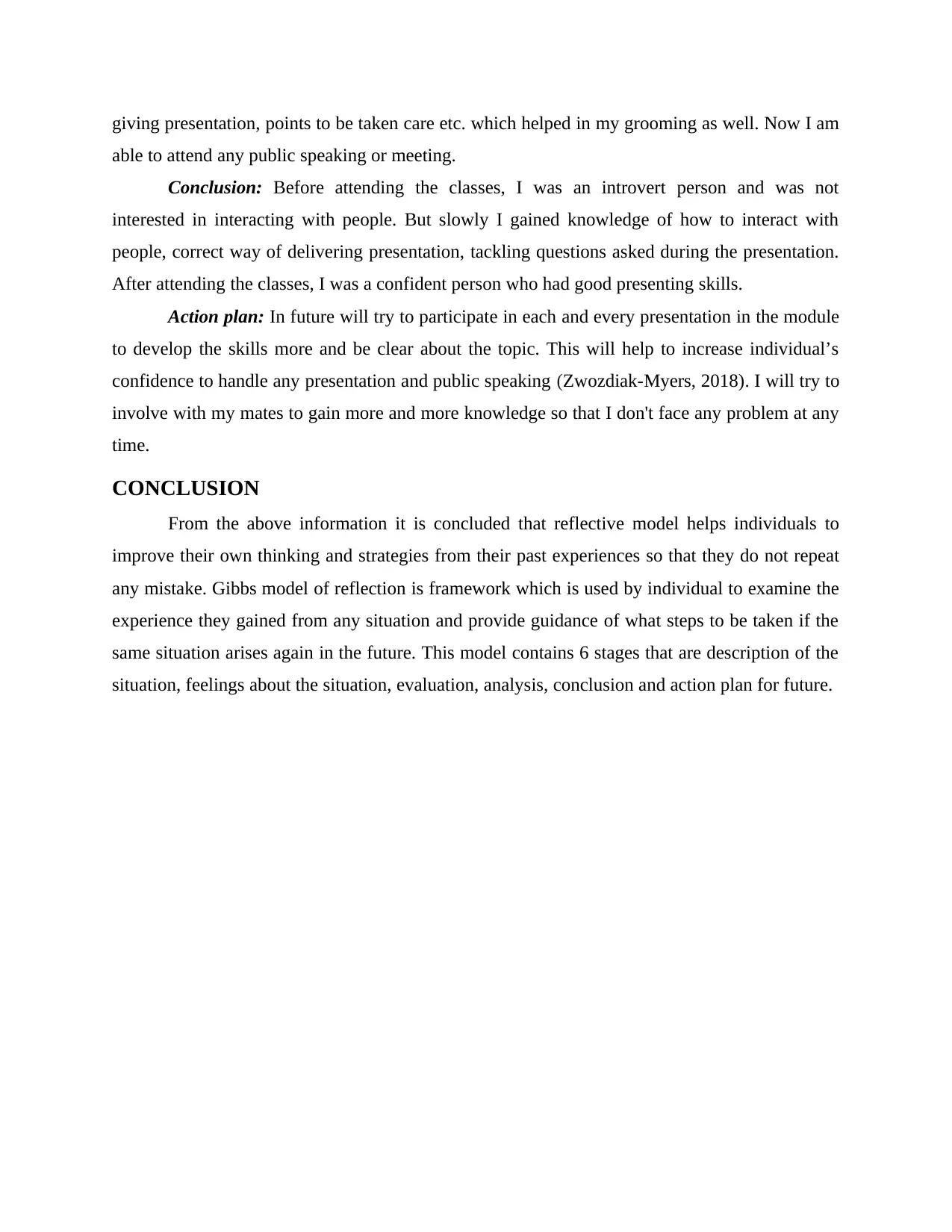
giving presentation, points to be taken care etc. which helped in my grooming as well. Now I am
able to attend any public speaking or meeting.
Conclusion: Before attending the classes, I was an introvert person and was not
interested in interacting with people. But slowly I gained knowledge of how to interact with
people, correct way of delivering presentation, tackling questions asked during the presentation.
After attending the classes, I was a confident person who had good presenting skills.
Action plan: In future will try to participate in each and every presentation in the module
to develop the skills more and be clear about the topic. This will help to increase individual’s
confidence to handle any presentation and public speaking (Zwozdiak-Myers, 2018). I will try to
involve with my mates to gain more and more knowledge so that I don't face any problem at any
time.
CONCLUSION
From the above information it is concluded that reflective model helps individuals to
improve their own thinking and strategies from their past experiences so that they do not repeat
any mistake. Gibbs model of reflection is framework which is used by individual to examine the
experience they gained from any situation and provide guidance of what steps to be taken if the
same situation arises again in the future. This model contains 6 stages that are description of the
situation, feelings about the situation, evaluation, analysis, conclusion and action plan for future.
able to attend any public speaking or meeting.
Conclusion: Before attending the classes, I was an introvert person and was not
interested in interacting with people. But slowly I gained knowledge of how to interact with
people, correct way of delivering presentation, tackling questions asked during the presentation.
After attending the classes, I was a confident person who had good presenting skills.
Action plan: In future will try to participate in each and every presentation in the module
to develop the skills more and be clear about the topic. This will help to increase individual’s
confidence to handle any presentation and public speaking (Zwozdiak-Myers, 2018). I will try to
involve with my mates to gain more and more knowledge so that I don't face any problem at any
time.
CONCLUSION
From the above information it is concluded that reflective model helps individuals to
improve their own thinking and strategies from their past experiences so that they do not repeat
any mistake. Gibbs model of reflection is framework which is used by individual to examine the
experience they gained from any situation and provide guidance of what steps to be taken if the
same situation arises again in the future. This model contains 6 stages that are description of the
situation, feelings about the situation, evaluation, analysis, conclusion and action plan for future.
Paraphrase This Document
Need a fresh take? Get an instant paraphrase of this document with our AI Paraphraser
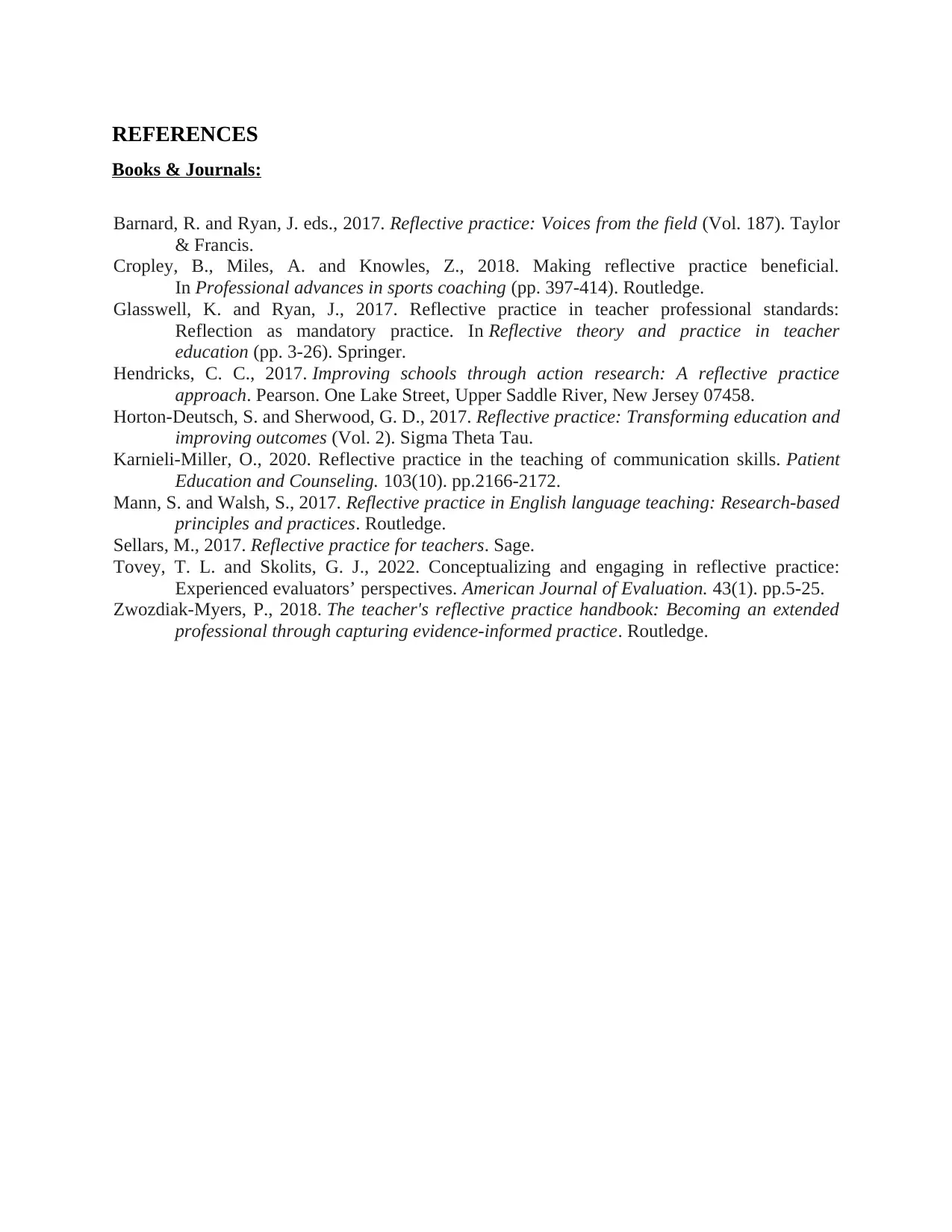
REFERENCES
Books & Journals:
Barnard, R. and Ryan, J. eds., 2017. Reflective practice: Voices from the field (Vol. 187). Taylor
& Francis.
Cropley, B., Miles, A. and Knowles, Z., 2018. Making reflective practice beneficial.
In Professional advances in sports coaching (pp. 397-414). Routledge.
Glasswell, K. and Ryan, J., 2017. Reflective practice in teacher professional standards:
Reflection as mandatory practice. In Reflective theory and practice in teacher
education (pp. 3-26). Springer.
Hendricks, C. C., 2017. Improving schools through action research: A reflective practice
approach. Pearson. One Lake Street, Upper Saddle River, New Jersey 07458.
Horton-Deutsch, S. and Sherwood, G. D., 2017. Reflective practice: Transforming education and
improving outcomes (Vol. 2). Sigma Theta Tau.
Karnieli-Miller, O., 2020. Reflective practice in the teaching of communication skills. Patient
Education and Counseling. 103(10). pp.2166-2172.
Mann, S. and Walsh, S., 2017. Reflective practice in English language teaching: Research-based
principles and practices. Routledge.
Sellars, M., 2017. Reflective practice for teachers. Sage.
Tovey, T. L. and Skolits, G. J., 2022. Conceptualizing and engaging in reflective practice:
Experienced evaluators’ perspectives. American Journal of Evaluation. 43(1). pp.5-25.
Zwozdiak-Myers, P., 2018. The teacher's reflective practice handbook: Becoming an extended
professional through capturing evidence-informed practice. Routledge.
Books & Journals:
Barnard, R. and Ryan, J. eds., 2017. Reflective practice: Voices from the field (Vol. 187). Taylor
& Francis.
Cropley, B., Miles, A. and Knowles, Z., 2018. Making reflective practice beneficial.
In Professional advances in sports coaching (pp. 397-414). Routledge.
Glasswell, K. and Ryan, J., 2017. Reflective practice in teacher professional standards:
Reflection as mandatory practice. In Reflective theory and practice in teacher
education (pp. 3-26). Springer.
Hendricks, C. C., 2017. Improving schools through action research: A reflective practice
approach. Pearson. One Lake Street, Upper Saddle River, New Jersey 07458.
Horton-Deutsch, S. and Sherwood, G. D., 2017. Reflective practice: Transforming education and
improving outcomes (Vol. 2). Sigma Theta Tau.
Karnieli-Miller, O., 2020. Reflective practice in the teaching of communication skills. Patient
Education and Counseling. 103(10). pp.2166-2172.
Mann, S. and Walsh, S., 2017. Reflective practice in English language teaching: Research-based
principles and practices. Routledge.
Sellars, M., 2017. Reflective practice for teachers. Sage.
Tovey, T. L. and Skolits, G. J., 2022. Conceptualizing and engaging in reflective practice:
Experienced evaluators’ perspectives. American Journal of Evaluation. 43(1). pp.5-25.
Zwozdiak-Myers, P., 2018. The teacher's reflective practice handbook: Becoming an extended
professional through capturing evidence-informed practice. Routledge.
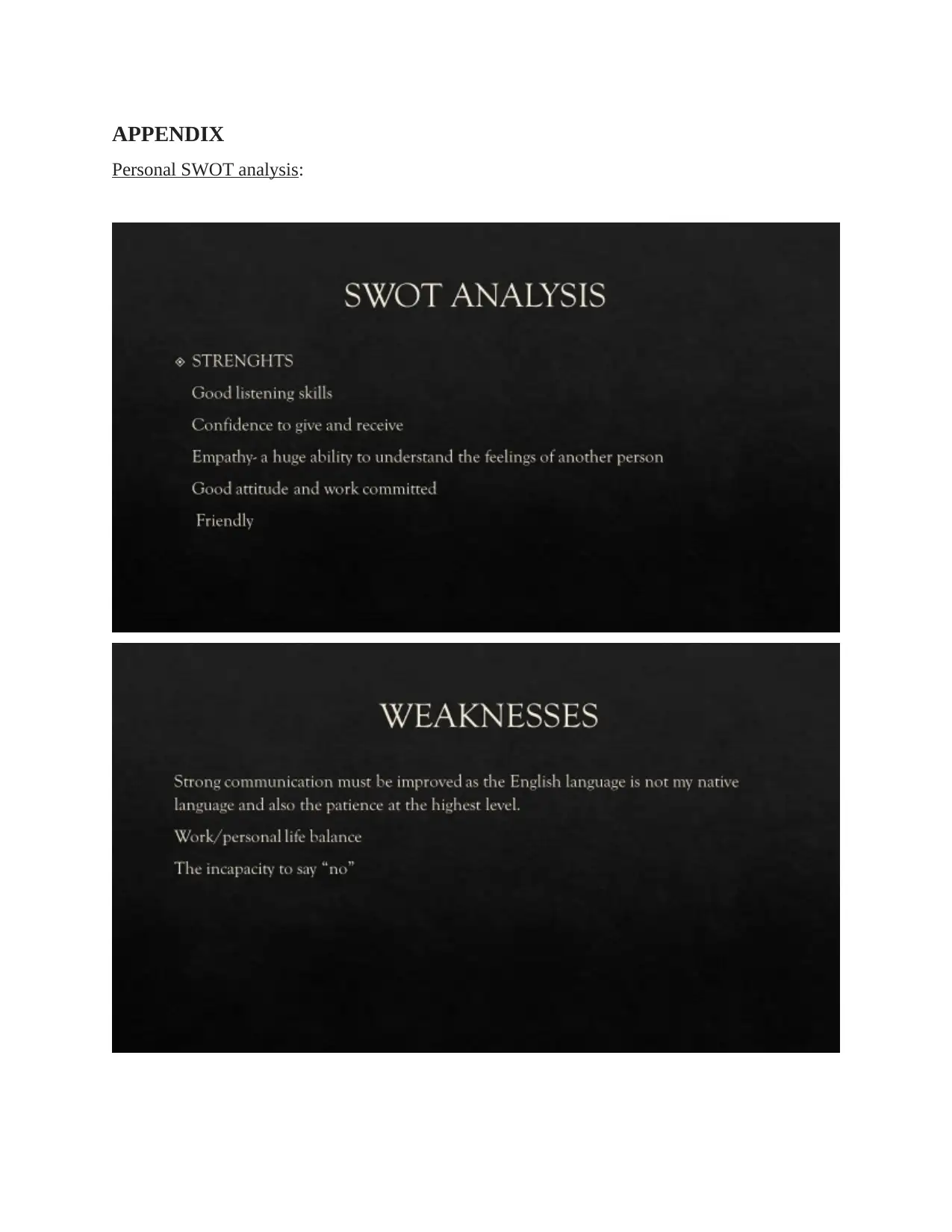
APPENDIX
Personal SWOT analysis:
Personal SWOT analysis:
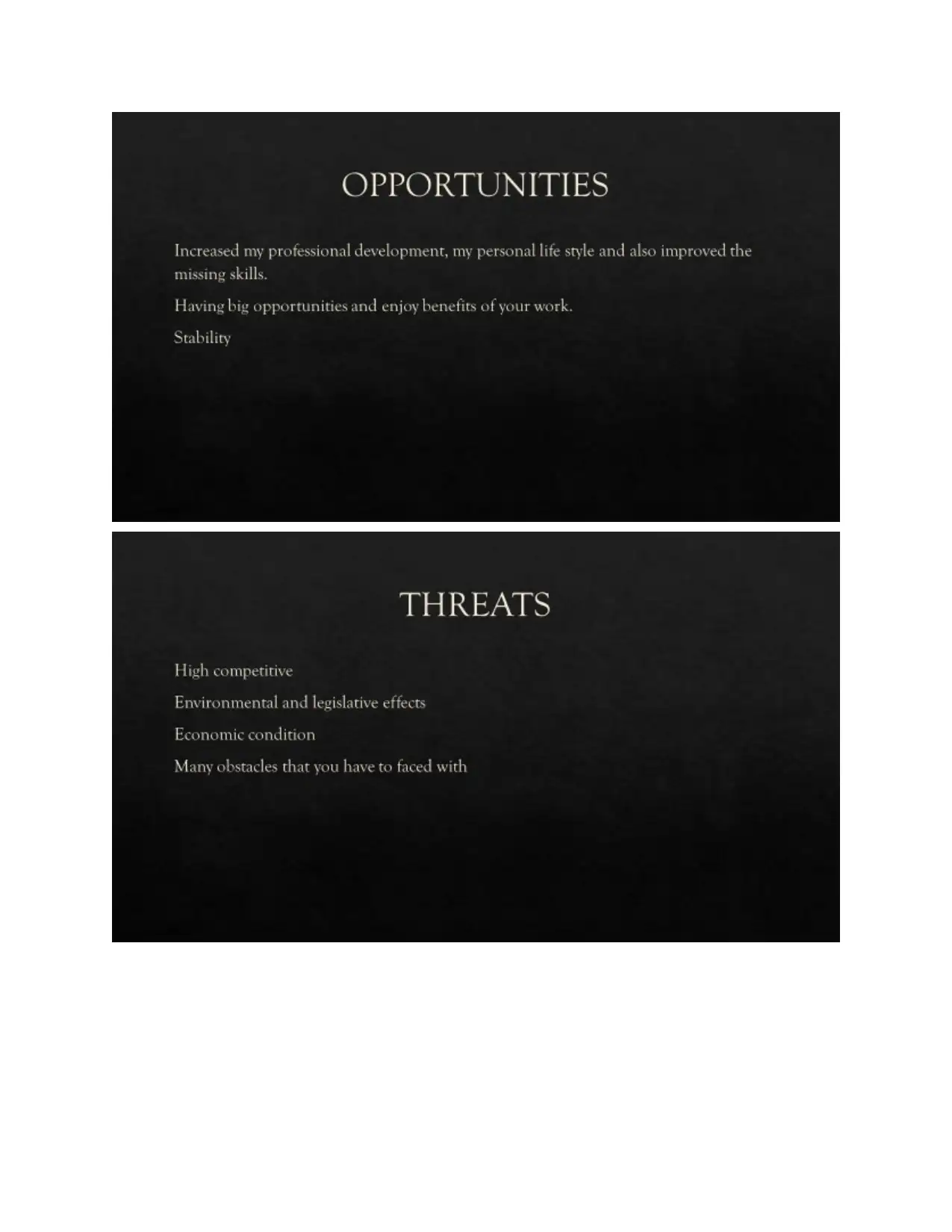
1 out of 10
Related Documents
Your All-in-One AI-Powered Toolkit for Academic Success.
+13062052269
info@desklib.com
Available 24*7 on WhatsApp / Email
![[object Object]](/_next/static/media/star-bottom.7253800d.svg)
Unlock your academic potential
© 2024 | Zucol Services PVT LTD | All rights reserved.




